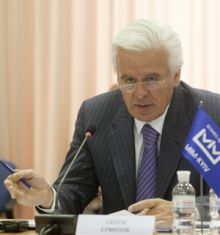For a third year in a row, the Swiss IMD-Lausanne business school ranks Ukraine as one of the least attractive states for opening and doing business in its World Competitiveness Yearbook. We were second from last the year before last and third from the end last year on the IMD ranking list. This year we are 56th out of 59, leaving behind only Croatia, Greece, and Venezuela.
The rating showed the increase of investment risks, political instability risk, worsening of the country’s image abroad, high cost of capital, and poor intellectual property rights protection, just to mention a few.
As previously, survey of business people is a considerable part of the rating (it is the second part of the study, the first being official statistics data). Ukraine’s business people mentioned problems related to economy’s dependence upon the cycles and low diversification, ineffective legal framework, corruption, bad performance of customs, outdated energy infrastructure and public health. They also indicated low level of business practices and managerial performance. That resulted in the low position of Ukraine in such categories as corporate social responsibility, introduction of ethical practices in companies, client orientation, etc.
Interestingly, although Ukraine ranks second from last in the societal framework, the entrepreneurs polled by the Swiss researchers point out a high level of public awareness of the need for socioeconomic reforms. While Ukraine ranked 18th by this indicator in 2011, it is the 15th this year.
Naturally, there can be different attitudes to ratings. They can be treated as either serious or just interesting information. The International Institute of Management (MIM-Kyiv), the official partner of IMD in Ukraine, suggests that the researchers’ findings be at least analyzed. For if a country that has enviable resources and advantageous geopolitical position has been an outsider for three years in a row, it is an alarming signal.
The roundtable’s topic was “Global Competitiveness in the Conditions of Capital Intellectualization.”
As MIM-Kyiv President Iryna Tykhomyrova emphasized in an interview with The Day on the eve of the event, this expert forum, initiated by the business school, is interesting, above all, by that fact that it “gives us an opportunity to find and analyze those factors of our competitive advantage which, if properly developed, would have further impact on Ukraine’s position in the global competitiveness rating” (see “How to Get Out of Non-Competitiveness Pit?”, The Day, No. 35, June 12, 2012). As the study shows, this includes power generation, the agrarian sector, information technologies, finances, and, naturally, education.
As the roundtable’s information partner, The Day managed to conduct exclusive interviews with the invited experts. Yet some of our questions – such as, for example, why the government, whose members must have learned very well the lesson of competition, for, otherwise, they would not have built successful business, has failed to put this experience into nationwide practice; whether land reform can improve Ukraine’s investment attractiveness; and why the state is losing competitive positions to its domestic creditors (see “Alarming Signal,” Den, No. 95, June 6, 2012) – still remained unanswered.
SOLAR AND WIND POWER RANKS LAST, AS FAR AS FUEL SAVING OR INVESTMENT PAYBACK TIME IS CONCERNED, BUT IS FUNDED BY THE STATE IN THE FIRST PLACE. WHY?
Serhii YERMILOV, director, Institute of the Problems of Ecology and Energy Conservation:
“The government must have only one priority in its energy conservation policy: it should focus on the areas that provide the largest return on investment. If we draw up a list of 10 or 15 items of the energy efficiency program and place them on the basis of payback period or energy/fuel conservation, we will see the real ‘candidate recipients’ of funds. The solar and wind power ranks last but is funded in the first place. Why? This can be called the success of certain business groups.”
So what sectors should be funded first of all?
“One must invest in energy-saving technologies for buildings. There are about 200,000 highrises in Ukraine, with 10 percent of them being in an emergency condition. And almost all the 200,000 do not meet energy-saving standards. By modernizing this sector alone, we can save 50 percent of energy costs.”
In other words, the energy loss factor in the housing sector is 50 percent?
“Not less than that. In Germany, for example, the power inputs standard is 70 kWh per square meter a year. This includes heating, water and electricity supply. By contrast, in Ukraine this standard is 300 kWh per square meter a year, although in the new-type buildings it is 150 to 180. This means we use four times as much power to maintain buildings as the Europeans do.”
Who is to pay for increasing Ukraine’s competitiveness as a result of the reduction of energy consumption in the economy? For the program you mentioned envisages the use of, first of all, budgetary funds, i.e., the money of ordinary taxpayers.
“We cannot allow energy saving programs to be fully funded by the state or local budgets due to revenue shortages. But if the state does not take up at least 15 percent of the overall expenses, we will be unable at all to raise funds for the modernization of buildings.
“The state gives one percent today, but business gives nothing because the system does not work. 100-percernt funding by the state? What for? You just give us 10 percent and a good law. A 15-percent share makes it possible to create conditions for attracting funds for energy conservation from the private sector – in other words, funding will be done at the expense of business and governmental loans.
“It is, incidentally, the practice of Japan and South Korea. In these countries, the state finances 15 to 20 percent of the energy saving program’s targets. The rest comes from business or the private sector.”
Suppose this model has been brought into play in Ukraine. How many years will it take to reach the “normal” level of power inputs?
“If the state allocates an annual five billion hryvnias for the energy saving program, we will have achieved the European level of power inputs by 2030.”
“WE LIVE IN A POSTINDUSTRIAL WORLD, AND IT IS TIME WE DROPPED THE DESIRE TO LIVE IN AN AGRARIAN PARADISE”
Yurii LOHUSH, vice-president, PJSC Myronivsky Hliboproduct:
“Indeed, if we compare ourselves with other countries, we will see that our agriculture is awfully energy-consuming, as are all the other sectors. We are still to apply new technologies of intensive farming. The crops are poor. This brings about a very heavy load on a hectare of arable land. Add to this the changeable weather which forces us to re-sow and, accordingly, to raise our expenses by 30 percent.”
But the state subsidizes the agrarian producer. The funds for procuring fuel and re-sowing the damaged winter crops come from the state budget.
“If only the state didn’t stand in our way!”
Will Ukraine be able to boost the competitiveness of its agriculture by banking on agro holding companies or on small farms?
“Look: Elzbieta Kawecka-Wyrzykowska from the Warsaw School of Economics spoke on everything but agriculture today. Why do you think she did so? Because it is in a disastrous condition there – only because the sector is in the hand of small-scale farmers.
“Naturally, small-scale farmers are sort of a backbone in a country. But, on the other hand, in all the developed countries, the percentage of the population engaged in agriculture is steadily diminishing. In such a powerful agrarian country as the US, a mere two percent of the population work in the agrarian sector.
“In a word, the world is tending to concentrate resources. In agriculture, it is agro-holdings. For only in these conditions can one achieve the greatest effectiveness. And if Ukraine wants to be a leader and be able to feed a billion of people, we must have big farms. For if we plow tiny plots of land by means of a small tractor, our energy consumption and the prime cost of our produce will in no way be diminishing.”
But agro-holdings are killing villages, which Ukraine has already seen…
“It is obviously so. It is the process that has brought the share of farmers in the [US] population down to two percent.”
Do you mean it is also a positive tendency for Ukraine?
“It is an awful tendency, but we are living in a postindustrial world, and it is time we dropped the desire to live in an agrarian paradise.”
“OUR COMPANIES WORKED AS CONTRACTORS FOR DEVELOPERS AND NONE OF THEM TURNED OUT A PRODUCT OF THEIR OWN”
Oleksandr KARDAKOV, Chairman, Supervisory Board, company Octava Capital:
“Information technologies are Ukraine’s last high-tech sector that can be presented today on the global market. We have lost, to put it mildly, aviation and outer space.
“Information technologies have remained afloat owing to a banal factor – nobody has just noticed them for 20 years. The sector has been developing thanks to private initiative alone. In this period, about 2,000 small and medium companies have sprung up in this country, which later grew into big businesses.”
The sector has been noticed now – by parliament, the auditing bodies, etc.
“We all gathered 18 months ago and concluded that it was no longer possible to work as we used to. This brought forth an idea to draw up a law to protect the IT industry. The changes are essentially not about privileges, as some are claiming today, but about equalization of conditions. For everybody who is now working in software and IT business is in a global competitive environment. The main and perhaps the only thing that worries us are taxes on salary. For the prime cost of our products to be competitive, these taxes should be cut down. The Verkhovna Rada has sided with and supported us.”
Is what the MPs voted for today enough for Ukraine to be one of the world’s IT leaders a decade later?
“Yes.”
What share of the worldwide IT market is Ukraine controlling today?
“About 10 to 15 percent.”
We often hear that Ukrainian IT specialists are among the world’s top 10, but Ukraine still does not have an IT brand on the world market. Why?
“The main cause is that our companies worked as contractors for developers and none of them turned out a product of their own. There is a hope, however, that the law passed to support the IT sector will create conditions for the birth of a Ukrainian IT brand.”










